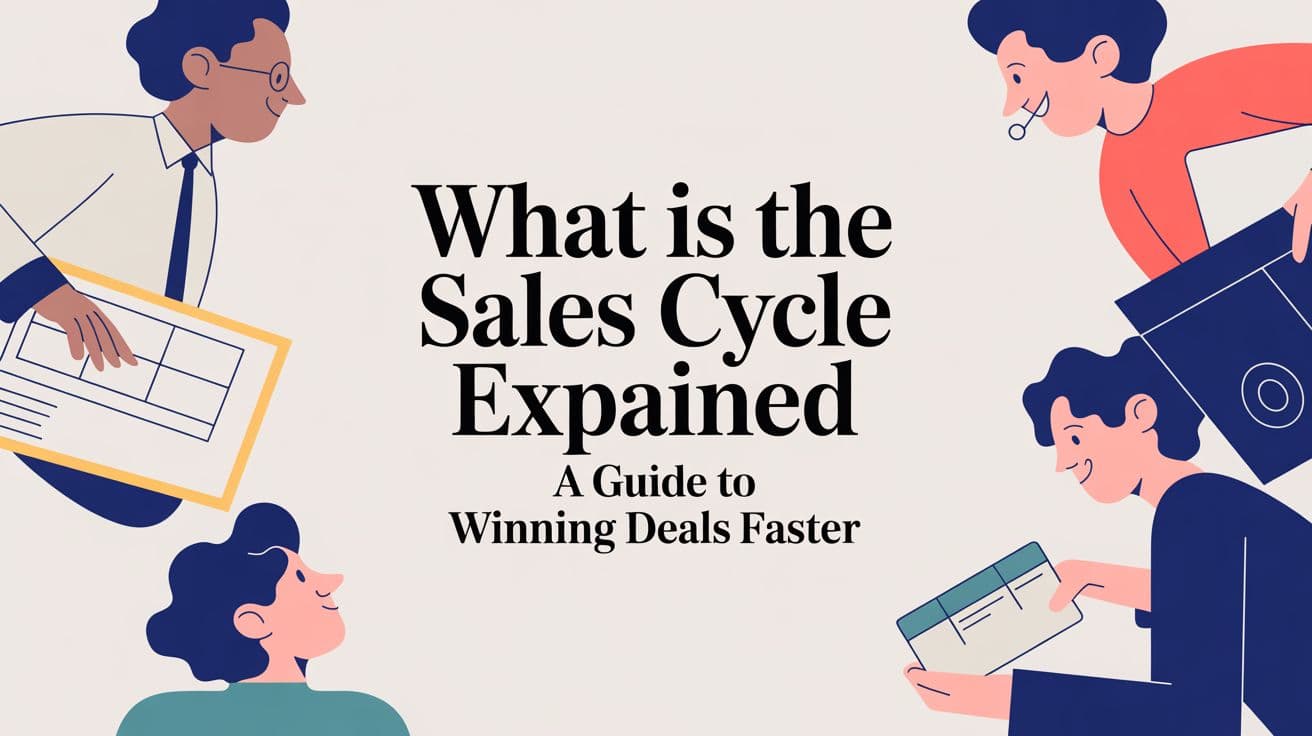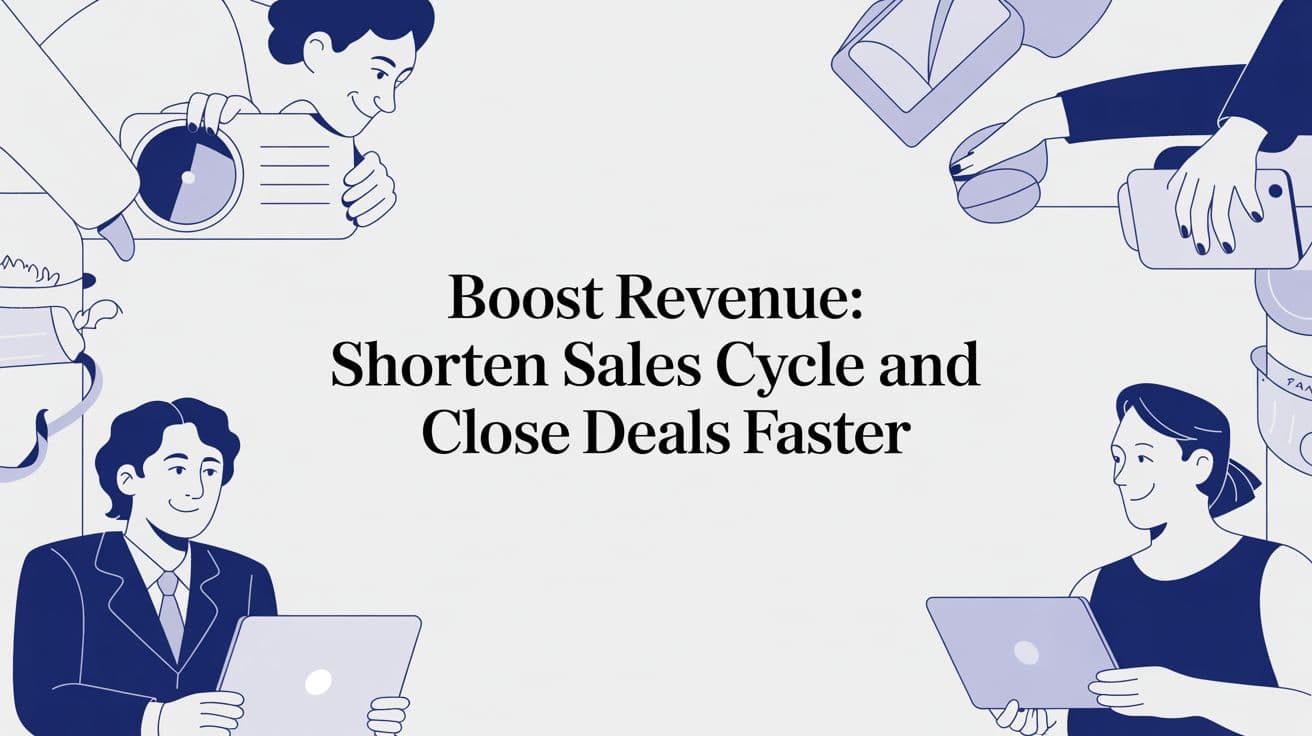TL;DR
Deal intelligence cuts through the noise of sales by analyzing every buyer interaction—calls, emails, meetings—to give you a real-time, unbiased look at a deal's health. It replaces guesswork with data-driven insights, helping your team focus on winnable deals, forecast accurately, and close faster.
Deal intelligence is all about gathering and making sense of the data from every single buyer interaction to get a real read on the health of a deal. This goes way beyond just looking at CRM entries. It gives revenue teams the kind of actionable insights they need to forecast accurately, focus on the deals they can actually win, and speed up the sales cycle by spotting risks before they blow up.
Decoding Your Sales Pipeline

Real deal intelligence gives you a complete, unfiltered picture of what's actually happening in your pipeline. Instead of running on gut feelings or incomplete notes, you're using hard data from calls, emails, and meetings to see things clearly.
This approach helps your teams truly understand stakeholder engagement, uncover those hidden risks, and pinpoint the exact coaching moments that turn good reps into great ones. By focusing on real-time interaction data, you shift from reactive problem-solving to proactive deal management. That shift is absolutely critical for building a predictable revenue engine and making sure your sales efforts are pointed exactly where they’ll have the biggest impact.
See Salesmotion in action
Take a self-guided interactive tour — no signup required.
What Is Deal Intelligence
Let’s cut to the chase. Deal intelligence is all about getting the real story behind every deal in your pipeline. It’s the practice of capturing and analyzing data from every single buyer interaction—calls, emails, meetings—to build an honest, unbiased picture of an opportunity's health.
This moves way beyond relying on a sales rep's gut feeling or their manually entered (and often overly optimistic) CRM notes. Instead of hoping for the best, you get a reality-based understanding of where a deal truly stands.
It's important to distinguish this from other buzzwords. Sales intelligence is mostly about finding new leads or beefing up contact info. Market intelligence looks at the big picture, like industry trends. Deal intelligence zooms right in on the specific back-and-forth happening within an active sales cycle. It's about what's happening right now with the people you're trying to sell to.
The Core Components of Deal Intelligence
To be truly useful, deal intelligence has to answer three critical questions for every single opportunity. It does this by systematically collecting and making sense of interaction data, turning raw conversations into strategic insights that tell your team exactly what to do next.
- Who is involved? This isn't just about who's listed in the CRM. It’s about identifying every stakeholder, mapping out the full buying committee, pinpointing your champion, and flagging those quiet detractors who could kill the deal. Understanding the 'who' means knowing who is actually engaged and has real influence.
- What do they need? This goes much deeper than surface-level discovery questions. By analyzing the actual language used in calls and emails, you uncover the buyer’s true pain points, their business goals, and what success looks like for them. It shows you what they genuinely care about, so you can tailor your value prop perfectly.
- How are they engaging? This tracks the pulse of all communications—the frequency, direction, and even the sentiment. Is your champion responding quickly? Are new executives suddenly joining calls late in the game? A sudden drop in communication is one of the earliest warning signs of a deal going sideways.
Distinguishing Key Intelligence Types
Getting these definitions straight is crucial for building a focused revenue strategy. Each type of intelligence has its place, but deal intelligence provides the ground truth you need for accurate forecasting and effective coaching.
| Intelligence Type | Primary Focus | Key Question It Answers |
|---|---|---|
| Deal Intelligence | Active sales opportunities | "Is this specific deal on track to close?" |
| Sales Intelligence | Prospecting and lead generation | "Who are the right people and companies to target?" |
| Market Intelligence | Industry trends and competitors | "What is happening in our market landscape?" |
By focusing on the dynamics within an active sales cycle, deal intelligence provides the context that CRM data alone cannot. It answers the fundamental question every sales leader has: "What is really going on with this deal?" This clarity is what separates predictable revenue from hopeful guessing.
Ultimately, a strong deal intelligence strategy is foundational for any modern sales organization. It creates a clear, data-backed language for discussing pipeline health, which allows teams to spot risks early, replicate winning patterns, and forecast with confidence. It's the difference between navigating a deal with a map versus flying blind.
“Salesmotion has been a game-changer for me. I used to spend 12 hours a week on prospect research, now it's down to 4. Plus I'm finding stuff I was totally missing - podcasts, news mentions, the good bits.”
George Treschi
Account Executive, FY25 President's Club, Sigma
Why Deal Intelligence Matters for Revenue Teams

It’s one thing to define a term, but the real question is how deal intelligence actually translates into results. What does it do for a revenue team? The short answer is that it pulls sales, marketing, and customer success out of their silos and gets them operating from a single, data-driven truth about every deal.
This is the difference between hoping for outcomes and engineering them. It’s a strategic shift that directly impacts the bottom line by helping teams focus their most valuable resource—time—on opportunities that actually have a shot at closing. Instead of spreading effort thinly across the entire pipeline, reps can zero in on deals where the engagement and momentum are real.
Drive Higher Win Rates
First and foremost, deal intelligence helps you win more. Simple as that. By analyzing buyer interactions, these platforms can score the health of a deal and flag risks long before a rep’s gut feeling even kicks in.
This allows managers to jump in with targeted coaching and resources exactly where they’re needed most. For instance, if a key champion suddenly goes quiet or a competitor’s name starts popping up frequently in calls, the system alerts the team. It gives you a chance to be proactive and salvage deals that would otherwise slip away.
By illuminating the true health of each deal, teams can avoid wasting cycles on opportunities that are unlikely to close. The result is a more focused, efficient sales motion that channels energy into winning business.
Achieve More Accurate Forecasting
Guesswork is the enemy of predictable revenue. For too long, sales leaders have had to rely on rep-reported confidence levels, which are notoriously optimistic. Deal intelligence replaces that subjective guesswork with objective, data-backed forecasting.
Now, leaders can base their forecasts on concrete engagement metrics that paint a much clearer picture of pipeline health.
- Stakeholder Involvement: Is the economic buyer actually showing up to meetings?
- Communication Cadence: Has the back-and-forth of emails and calls sped up or slowed down?
- Sentiment Analysis: Is the prospect’s language positive and solution-focused, or are they dragging their feet?
This level of detail leads to forecasts that leadership can actually trust. The broader trend is clear: the industry is moving toward data-driven sales. The related field of sales intelligence was valued at USD 2.95 billion in 2022 and is projected to hit USD 6.68 billion by 2030, showing just how massive the push for smarter, AI-enhanced sales processes has become.
Shorten Sales Cycles and Boost Velocity
Finally, deal intelligence helps you close deals faster by finding and removing the roadblocks. When you understand the typical engagement patterns of your won deals, you can instantly spot when a current opportunity is stalling out.
That visibility lets reps proactively address the issue, whether that means bringing in a technical expert to handle specific questions or re-engaging a stakeholder who has dropped out of the conversation. To really dig into the mechanics of moving deals faster, check out our detailed guide on improving your pipeline velocity.
By keeping deals moving forward and eliminating friction, you not only close business faster but also increase your entire pipeline's throughput—a crucial factor for hitting aggressive revenue targets.
How AI Powers Modern Deal Intelligence
Modern deal intelligence isn’t just about having more data; it’s about making that data tell a story. This is where Artificial Intelligence (AI) and Machine Learning (ML) come in, acting as the engine that turns mountains of raw sales interactions into clear, predictive insights.
Instead of your team manually digging through call notes or email chains, AI automates the whole analysis. It listens to every call, reads every email, and pores over every meeting transcript to find the critical info that signals a deal's true health. This frees up your sales team from painful admin work so they can focus on what they do best: building relationships and closing deals.
The incredible growth in AI's capabilities is a huge factor here. The global AI market was valued at USD 638.23 billion in 2024 and is expected to rocket to nearly USD 3.68 trillion by 2034. This boom shows just how deeply AI is getting woven into core business functions like sales.
Uncovering Insights with Natural Language Processing
At the heart of AI-driven deal intelligence is Natural Language Processing (NLP). Think of NLP as a translator that gets the nuances of human language—not just the words, but the intent and emotion behind them.
NLP algorithms analyze conversations to do a few key things:
- Sentiment Analysis: The system picks up on the buyer's emotional tone. Are they enthusiastic and engaged, or are they showing frustration and doubt? This helps reps gauge the real feeling behind the words.
- Topic Detection: AI identifies and tags key topics discussed, like pricing, competitors, or specific product features. This lets sales leaders quickly see what matters most to buyers across all deals.
- Action Item Identification: The platform automatically flags next steps and commitments made during a call, making sure nothing falls through the cracks.
Predicting Outcomes and Scoring Deals
Beyond just understanding language, AI is a master at spotting patterns and predicting what will happen next. This is where predictive analytics comes into play. By analyzing historical data from thousands of won and lost deals, the system learns what a successful engagement actually looks like.
This predictive power is a complete game-changer for sales leaders. Instead of relying on a rep's gut feeling for a confidence score, you get an objective, data-driven health score for every deal in your pipeline.
This deal health score is calculated based on factors like multi-threading (engaging multiple stakeholders), positive sentiment, and consistent communication. When a deal's score drops, the platform flags it as "at-risk," prompting managers to jump in before it's too late.
The rise of sophisticated tools like the AI sales agent is making this level of automated oversight more accessible than ever. And to truly modernize deal intelligence, it's critical to understand how AI can streamline the preliminary stages of a sale, which is why leveraging AI for faster lead qualification is such an important piece of the puzzle.
 A scored dashboard ranks accounts by combining engagement signals, deal health indicators, and ICP fit — giving revenue teams an objective view of pipeline reality.
A scored dashboard ranks accounts by combining engagement signals, deal health indicators, and ICP fit — giving revenue teams an objective view of pipeline reality.
“The Business Development team gets 80 to 90 percent of what they need in 15 minutes. That is a complete shift in how our reps work.”
Andrew Giordano
VP of Global Commercial Operations, Analytic Partners
How to Implement a Deal Intelligence Strategy
Rolling out a deal intelligence strategy isn't as simple as flipping a switch. It’s about building a data-driven foundation for your entire revenue team, and it demands a clear plan, the right tools, and—most importantly—buy-in from everyone involved. If you just throw powerful tech at your team without a structured approach, you'll end up with a very expensive tool that nobody uses.
A successful implementation is more than just installing software. It’s a cultural shift away from relying on gut feelings and toward trusting objective data from actual buyer interactions. This change helps your team zero in on winnable deals, forecast with more confidence, and get ahead of pipeline problems before they start.
This visual breaks down the core flow of AI-powered deal intelligence, showing how it turns raw data into actionable sales insights.
 AI-powered deal intelligence turns buyer interactions into clear strategic advantages.
AI-powered deal intelligence turns buyer interactions into clear strategic advantages.
It’s all about simplifying how teams turn countless interactions into a clear, strategic advantage that closes more business.
Define Clear Objectives and KPIs
Before you even look at a single platform, you have to know what you’re trying to fix. What specific sales challenges are you trying to solve? Vague goals like “improve sales” won’t get you anywhere. You need to get specific.
Your objectives should be measurable and tied directly to business outcomes. This clarity will guide every decision you make, from picking a vendor to training your team.
- Objective Example: Reduce the sales cycle for enterprise deals from 90 days to 75 days within two quarters.
- KPI Example: Track the average time deals spend in each sales stage, flagging any that are stuck.
Honestly, the most common reason these implementations fail is a lack of clear goals. Without defined success metrics, you can't measure ROI or prove the tool's value to leadership, making long-term buy-in nearly impossible.
Audit Your Data and Choose the Right Platform
Next up, take a hard look at your current data sources. Where are your buyer conversations actually happening? Think CRM, email, calendars, and call recording tools. Any deal intelligence platform you choose has to integrate seamlessly with your existing tech stack to pull in that data automatically.
When you start evaluating platforms, stay focused on the features that will solve the objectives you just defined. Key things to look for are the depth of CRM integration, the accuracy of the AI-driven insights, and how easily your reps can actually access the information. User adoption is everything, so prioritize tools with a clean interface that fits naturally into a seller's day-to-day workflow.
Secure Team Buy-In and Drive Adoption
A tool is only as good as the people who use it. Getting your team on board starts with explaining the "why" behind the change. Show your reps exactly how deal intelligence will make their lives easier—by cutting down on admin tasks, giving them real-time coaching on live deals, and ultimately helping them crush their quota.
I recommend starting with a pilot program. Pick a small group of motivated reps and let them run with it. Their success stories will become powerful internal case studies that get the rest of the team excited.
To keep the momentum going, weave the insights into your core sales motions:
- Make deal health scores a standard part of every pipeline review meeting. It should be the first thing you look at when discussing an opportunity.
- Use conversation insights to build a library of your best call recordings. This is gold for training new hires and coaching the whole team.
- Automate the routine stuff to give reps more selling time. Exploring options for sales process automation can uncover more ways to streamline workflows so sellers can focus on what they do best.
By making deal intelligence a non-negotiable part of your sales culture, you build a sustainable strategy that drives predictable revenue and empowers your team to win more deals.
How to Choose the Right Deal Intelligence Platform
Picking the right tool is the difference between getting game-changing insights and just adding another line item to your tech stack subscription costs. With so many options out there, you need a clear way to evaluate them. The best deal intelligence platform doesn't just throw data at you; it weaves itself into your sales process and actually helps your reps win.
This isn't about chasing flashy features. The right platform needs deep CRM integration, it has to be genuinely easy for your reps to use, and it must deliver accurate, AI-driven insights your team can actually trust. Making a smart choice now means you're investing in a solution that gets adopted, delivers real ROI, and grows with you.
Core Integration and Usability
Your deal intelligence platform has to feel like an extension of your CRM, not some separate island of data. If reps have to log into yet another system or manually sync information, they just won't use it. Period. Deep, native integration is non-negotiable.
The platform should automatically pull in and analyze data from the tools you already use—like Salesforce or HubSpot—without creating more admin work. Usability is just as critical. A clean, intuitive interface that shows key insights right inside the CRM records your reps live in every day is absolutely essential for driving adoption.
If the tool makes a seller's life harder, it has already failed. The goal is to remove friction, not add another complex process. Prioritize platforms that reps find genuinely helpful from day one.
Accuracy and Depth of AI Insights
The engine behind any great deal intelligence platform is its AI. But let's be honest, not all AI is created equal. You need to find a solution that goes way beyond basic sentiment analysis to give you insights you can actually act on.
When you're talking to vendors, ask them to run a demo using your own data if possible. This is the best way to see how accurate their deal health scoring really is and whether the risks they flag are relevant. The AI should be able to pinpoint specific buyer behaviors, map out the entire buying committee, and alert you to competitor mentions with precision. For a deeper look at how different tools operate, you can explore this overview of the top sales intelligence platforms to see what the market offers.
Scalability and Vendor Support
Finally, think about where you're headed. The platform you pick today needs to support your team as it grows. Can it handle larger volumes of data? Can it adapt to more complex sales motions? Will it integrate with other tools you might bring on later?
Vendor support is another huge piece of the puzzle. A great technology partner does more than just sell you software. They should provide solid onboarding, ongoing training, and strategic guidance to make sure you’re getting the most out of your investment.
To help you sort through your options, here’s a simple checklist you can use.
Evaluation Checklist for Deal Intelligence Platforms
When comparing deal intelligence tools, it's easy to get lost in feature lists. This checklist helps you focus on what really drives value for your sales team.
| Evaluation Criterion | What to Look For | Why It Matters |
|---|---|---|
| CRM Integration | Deep, native, and bidirectional sync with your CRM (e.g., Salesforce, HubSpot). Data should flow seamlessly without manual effort. | If it's not in the CRM, it doesn't exist for most reps. Poor integration kills adoption and creates data silos. |
| User Experience (UX) | An intuitive interface that surfaces insights within the rep's existing workflow. Minimal clicks and no steep learning curve. | A complex tool won't get used, no matter how powerful it is. The goal is to make a seller's job easier, not harder. |
| Insight Quality & AI | AI that provides specific, actionable recommendations, not just generic scores. Look for buyer intent, risk signals, and relationship mapping. | Vague insights are useless. The AI must tell you why a deal is at risk and suggest what to do about it. |
| Data Accuracy | High-precision data capture from emails, calls, and calendars. Accurate identification of stakeholders and competitor mentions. | If your team doesn't trust the data, they won't trust the insights. Inaccurate information leads to bad decisions. |
| Scalability | The ability to support a growing sales team, handle increasing data volumes, and adapt to more complex sales processes. | Your tool should grow with you, not hold you back. A platform that can't scale becomes a liability. |
| Vendor Support & Partnership | A vendor with a strong reputation for customer support, providing robust onboarding, ongoing training, and strategic guidance. | A good vendor is a partner. They should be invested in your success long after the contract is signed. |
Choosing the right platform is a strategic decision that will impact your entire revenue organization. By focusing on these key criteria, you can select a tool that truly empowers your team to close more deals, faster.
Common Questions About Deal Intelligence
As deal intelligence becomes a bigger part of modern sales, a few questions always pop up. Leaders and reps alike want to get their heads around how it works in the real world, how it's different from the tools they already use, and what it really takes to get started.
Here are some quick, no-fluff answers to the questions we hear most often. Think of it as a cheat sheet for figuring out where deal intelligence fits into your workflow and your strategy.
How Does Deal Intelligence Differ from CRM?
This is a really important distinction. Your CRM is basically a digital filing cabinet—a system of record. It only knows what your sales team manually types into it, and its accuracy is only as good as your reps' diligence with data entry. We all know how that goes.
A deal intelligence platform, on the other hand, is a system of insight. It plugs into your calls, emails, and meetings to automatically capture and make sense of what’s actually happening in a deal. It takes the static data in your CRM and breathes life into it with objective analysis, turning your database into a tool that can actually predict what's coming next.
Is This Just Another Tool for Sales Reps to Learn?
Not if you pick the right one. The best deal intelligence platforms are built to slide right into a rep's existing day-to-day, surfacing insights directly inside the CRM they already live in. Instead of giving them another chore, it takes the pain of manual research and data entry off their plate.
The whole point is to empower reps, not overwhelm them. By automating the grunt work and sending clear, actionable alerts, these platforms give reps their time back. That means more energy for what they’re best at: building relationships and closing deals.
What Is the Implementation Process Like?
Getting set up is usually pretty straightforward, especially with modern cloud-based tools. The whole process typically breaks down into three simple steps:
- Connect your data sources: This just means linking up your CRM, email server (like Outlook or Gmail), and calendars.
- Configure your team: You’ll add your users and decide who gets to see what with different roles and permissions.
- Initial data analysis: The platform's AI gets to work, crunching your historical and real-time interaction data to figure out what "normal" looks like for your team.
Any good vendor will hold your hand through this, making sure the rollout is smooth. Most teams are up and running and seeing their first insights in a matter of days or weeks, not months.
Key Takeaways
- Deal intelligence captures and analyzes data from every buyer interaction -- calls, emails, meetings -- to build an unbiased, real-time picture of pipeline health that replaces gut-feel forecasting.
- It answers three critical questions for every opportunity: who is involved in the buying committee, what do they actually need, and how are they engaging with your team over time.
- AI-powered deal intelligence uses natural language processing to detect sentiment, identify action items, and score deal health based on patterns from thousands of won and lost deals.
- Successful implementation requires clear measurable objectives, deep CRM integration, and team buy-in driven by showing reps how the tool saves them time and helps them hit quota.
- When evaluating platforms, prioritize insight quality and AI accuracy over feature lists -- the tool must tell you why a deal is at risk and suggest specific next steps, not just provide a generic score.
Frequently Asked Questions
What is the main benefit of deal intelligence?
The main benefit is moving from subjective, gut-feel-based sales to objective, data-driven decision-making. It provides a true, unbiased view of pipeline health, which leads to more accurate forecasting, higher win rates, and shorter sales cycles because you can focus your effort on deals that are actually winnable.
How does deal intelligence differ from sales intelligence?
Sales intelligence focuses on the top of the funnel—finding new leads, gathering contact information, and identifying potential accounts. Deal intelligence focuses on the middle and bottom of the funnel, analyzing interactions with active opportunities to determine their likelihood of closing and identify risks.
Is deal intelligence difficult to implement?
No, modern platforms are designed for quick and easy implementation. The process usually involves connecting your existing tools (CRM, email, calendar), which can often be done in days, not months. A good vendor will provide support to ensure a smooth rollout and user adoption.
Will my sales reps actually use it?
Yes, if you choose the right platform. The key is deep integration with your CRM. When insights, alerts, and coaching tips appear directly within the tools reps already use daily, it becomes a helpful assistant that saves them time, rather than another piece of software to learn.
Ready to stop guessing and start winning with data-backed insights? Salesmotion is the AI-powered account intelligence platform that automates the research and surfaces the "why now" signals you need to close more business. Discover how our platform can save your reps hours each week and drive predictable pipeline growth. Learn more and book your demo today.


